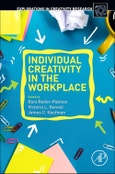Rapid technological change, global competition, and economic uncertainty have all contributed to organizations seeking to improve creativity and innovation. Researchers and businesses want to know what factors facilitate or inhibit creativity in a variety of organizational settings. Individual Creativity in the Workplace identifies those factors, including what motivational and cognitive factors influence individual creativity, as well as the contextual factors that impact creativity such as teams and leadership.The book takes research findings out of the lab and provides examples of these findings put to use in real world organizations.
Please Note: This is an On Demand product, delivery may take up to 11 working days after payment has been received.
Table of Contents
Section 1 Creativity and Innovation: Larger Concepts 1. Moving from creativity to innovation 2. Creativity and innovation in organizations 3. The fuzzy front-end: How creativity drives organizational innovation
Section 2: Intelligence and Cognition 4. Interruptions and multiple tasks: Advantages and disadvantages for creativity at work 5. Creative thought processes 6. The intellectual structure and outlooks for individual creativity research
Section 3: Motivation/affect/preferences 7. Creativity styles in the workplace: New versus Different 8. Freedom, structure, and creativity 9. Antecedents and consequences of self-efficacy for creativity in organizations 10. Affective experience and individual creativity at work
Section 4: Leadership and teams 11. The emergence of dual leaders in innovation management: When two heads are better than one 12. The influence of individual innovativeness and intelligence on occupational level among leaders 13. Individuals within a team context
Section 5: Application 14. Fostering creativity in organizations 15. Understanding the role of creativity in the 21st century Army 16. Leadership development: Training creativity skills for leaders








